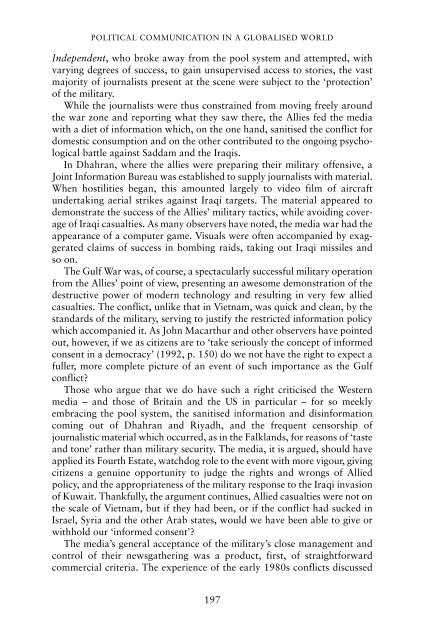20130412164339753295_book_an-introduction-to-political-communication
20130412164339753295_book_an-introduction-to-political-communication
20130412164339753295_book_an-introduction-to-political-communication
Create successful ePaper yourself
Turn your PDF publications into a flip-book with our unique Google optimized e-Paper software.
POLITICAL COMMUNICATION IN A GLOBALISED WORLD<br />
Independent, who broke away from the pool system <strong>an</strong>d attempted, with<br />
varying degrees of success, <strong>to</strong> gain unsupervised access <strong>to</strong> s<strong>to</strong>ries, the vast<br />
majority of journalists present at the scene were subject <strong>to</strong> the ‘protection’<br />
of the military.<br />
While the journalists were thus constrained from moving freely around<br />
the war zone <strong>an</strong>d reporting what they saw there, the Allies fed the media<br />
with a diet of information which, on the one h<strong>an</strong>d, s<strong>an</strong>itised the conflict for<br />
domestic consumption <strong>an</strong>d on the other contributed <strong>to</strong> the ongoing psychological<br />
battle against Saddam <strong>an</strong>d the Iraqis.<br />
In Dhahr<strong>an</strong>, where the allies were preparing their military offensive, a<br />
Joint Information Bureau was established <strong>to</strong> supply journalists with material.<br />
When hostilities beg<strong>an</strong>, this amounted largely <strong>to</strong> video film of aircraft<br />
undertaking aerial strikes against Iraqi targets. The material appeared <strong>to</strong><br />
demonstrate the success of the Allies’ military tactics, while avoiding coverage<br />
of Iraqi casualties. As m<strong>an</strong>y observers have noted, the media war had the<br />
appear<strong>an</strong>ce of a computer game. Visuals were often accomp<strong>an</strong>ied by exaggerated<br />
claims of success in bombing raids, taking out Iraqi missiles <strong>an</strong>d<br />
so on.<br />
The Gulf War was, of course, a spectacularly successful military operation<br />
from the Allies’ point of view, presenting <strong>an</strong> awesome demonstration of the<br />
destructive power of modern technology <strong>an</strong>d resulting in very few allied<br />
casualties. The conflict, unlike that in Vietnam, was quick <strong>an</strong>d cle<strong>an</strong>, by the<br />
st<strong>an</strong>dards of the military, serving <strong>to</strong> justify the restricted information policy<br />
which accomp<strong>an</strong>ied it. As John Macarthur <strong>an</strong>d other observers have pointed<br />
out, however, if we as citizens are <strong>to</strong> ‘take seriously the concept of informed<br />
consent in a democracy’ (1992, p. 150) do we not have the right <strong>to</strong> expect a<br />
fuller, more complete picture of <strong>an</strong> event of such import<strong>an</strong>ce as the Gulf<br />
conflict?<br />
Those who argue that we do have such a right criticised the Western<br />
media – <strong>an</strong>d those of Britain <strong>an</strong>d the US in particular – for so meekly<br />
embracing the pool system, the s<strong>an</strong>itised information <strong>an</strong>d disinformation<br />
coming out of Dhahr<strong>an</strong> <strong>an</strong>d Riyadh, <strong>an</strong>d the frequent censorship of<br />
journalistic material which occurred, as in the Falkl<strong>an</strong>ds, for reasons of ‘taste<br />
<strong>an</strong>d <strong>to</strong>ne’ rather th<strong>an</strong> military security. The media, it is argued, should have<br />
applied its Fourth Estate, watchdog role <strong>to</strong> the event with more vigour, giving<br />
citizens a genuine opportunity <strong>to</strong> judge the rights <strong>an</strong>d wrongs of Allied<br />
policy, <strong>an</strong>d the appropriateness of the military response <strong>to</strong> the Iraqi invasion<br />
of Kuwait. Th<strong>an</strong>kfully, the argument continues, Allied casualties were not on<br />
the scale of Vietnam, but if they had been, or if the conflict had sucked in<br />
Israel, Syria <strong>an</strong>d the other Arab states, would we have been able <strong>to</strong> give or<br />
withhold our ‘informed consent’?<br />
The media’s general accept<strong>an</strong>ce of the military’s close m<strong>an</strong>agement <strong>an</strong>d<br />
control of their newsgathering was a product, first, of straightforward<br />
commercial criteria. The experience of the early 1980s conflicts discussed<br />
197
















